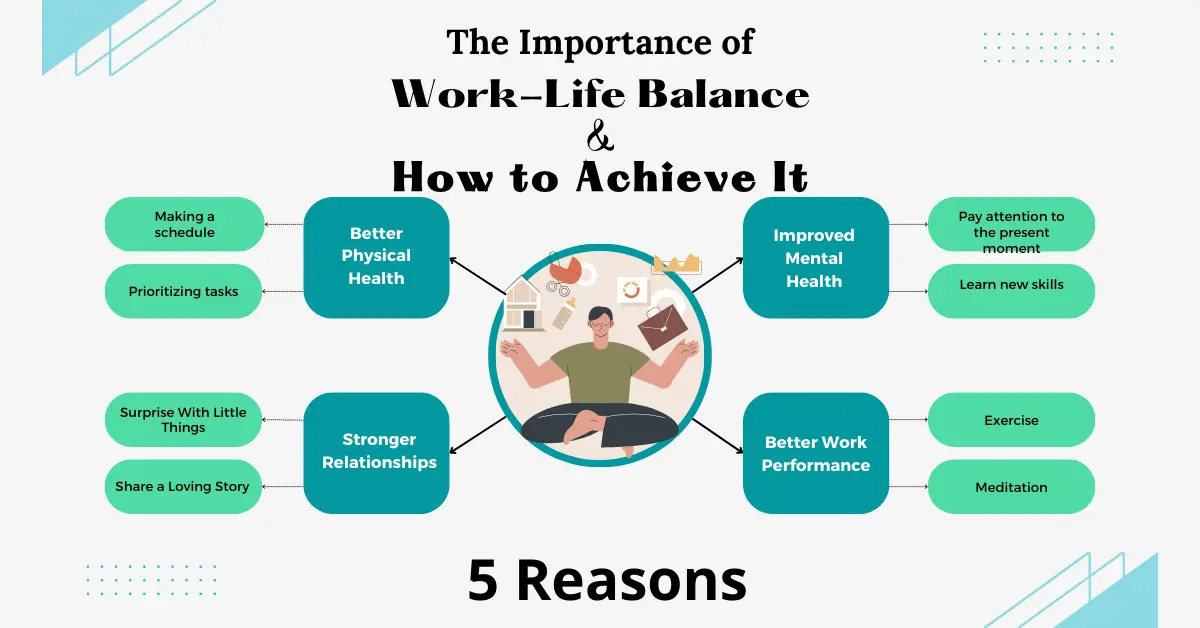
The Importance of Work-Life Balance and How to Achieve It – 5 Reasons
- 90
- 0
- 0
Work-life balance is necessary for sustaining health, happiness, and productivity. Balancing time between work and personal life helps reduce stress, prevent burnout, and allows you to enjoy life beyond your job. It’s important to set boundaries, manage time well, and take regular breaks. Making time for family, hobbies, and relaxation improves mental well-being and keeps you motivated at work. When work and personal life are balanced, you can be more focused and energized, which also boosts your performance. By creating a healthy balance, you take better care of yourself and become more effective in all areas of life.
The Importance of Work-Life Balance and How to Achieve It
Life today moves at a fast pace. Many of us spend long hours at work, answer emails at night, and barely find time for ourselves or our loved ones. But having a good balance between work and personal life is very important for our well-being. In this blog, we’ll look at why work-life balance matters and share helpful tips to make it happen.
What is Work-Life Balance?
Work-life balance means having sufficient time for both your job and your private life. It’s about being able to finish your work tasks while still having time for family, friends, hobbies, and rest. When you have a good work-life balance, you don’t feel like your job is taking over your entire life.
5 Key Reasons Why Work-Life Balance Matters
Better Physical Health

Better physical health means feeling stronger, more energetic, and healthier overall. It involves regular exercise, eating nutritious foods, staying active, and getting enough rest. Taking care of your body improves your mood and helps you live a longer, happier life.
Working too much can harm your health. When you spend all your time working:
- You might skip meals or eat unhealthy fast food
- You probably sit for too long without exercise
- You might not get enough sleep
- Your stress levels go up
- Your immune system becomes weaker
Having a good work-life balance gives you time to:
- Cook healthy meals
- Exercise regularly
- Get proper sleep
- Go for health check-ups
- Take breaks when needed
Improved Mental Health

Improved mental health means feeling more positive, focused, and calm. It involves managing stress, staying connected with loved ones, and practicing self-care. A healthy mind leads to better decision-making, greater happiness, and an overall sense of well-being.
Your mental fitness is just as essential as your physical health. Poor work-life balance often leads to:
- Stress and anxiety
- Feeling down or sad
- Burnout
- Feeling angry or frustrated easily
- Problems with memory and focus
When you balance career and life well, you:
- Feel more calm and relaxed
- Have better mood
- Think more clearly
- Handle problems better
- Feel happier overall
Stronger Relationships

Stronger relationships are built on trust, communication, and understanding. By spending quality time, listening actively, and supporting each other, you create deeper connections. Healthy relationships enhance your emotional well-being and provide a strong support system in life.
Always working can damage your relationships. You might:
- Miss important family events
- Not spending enough time with your children
- Lose touch with friends
- Have problems in your marriage or partnership
- Feel lonely and disconnected
Good work-life balance helps you:
- Be there for important moments
- Build stronger family bonds
- Keep good friendships
- Have quality time with your partner
- Make new friends and connections
Better Work Performance

Better work performance comes from staying focused, managing time effectively, and maintaining a healthy balance between work and rest. When you’re physically and mentally well, you can complete tasks efficiently, meet deadlines, and contribute positively to your team.
It might sound odd, but working all the time makes you less productive. When you’re always working:
- You get tired more easily
- You make more mistakes
- You have a problem coming up with new ideas
- Your work quality goes down
- You might start disliking your job
With proper balance, you:
- Have more energy at work
- Think more creatively
- Make fewer mistakes
- Feel more positive about your job
- Do better quality work
Personal Growth and Hobbies

Personal growth and hobbies are essential for a well-rounded life. Pursuing hobbies allows you to explore new skills, reduce stress, and boost creativity. Engaging in personal growth activities helps you improve self-awareness and build confidence, enriching your overall well-being.
Having time outside work is important for personal growth. Without work-life balance:
- You might give up hobbies you love
- You stop learning new things
- You lose your creative side
- You forget what you enjoy doing
- Your life becomes all about work
Good balance lets you:
- Try new hobbies
- Learn new skills
- Read books you like
- Follow your interests
- Grow as a person
How to Create Better Work-Life Balance
Creating a better work-life balance involves setting clear boundaries between work and personal time. Prioritize tasks, manage your time effectively, and make time for rest. Learn to say no when necessary, and focus on activities that bring joy and fulfillment.
Set Clear Boundaries
- Decide your work hours and attach them
- Turn off work notifications after hours
- Have a separate space for work
- Learn to say no to extra work
- Don’t check work emails during family time
Make Time for What Matters
- Plan family activities
- Schedule exercise
- Set aside time for hobbies
- Make regular plans with friends
- Keep your weekends for personal time
Take Care of Your Health
- Get 7-8 hours of sleep
- Eat regular, healthy meals
- Exercise at least 30 minutes daily
- Take short breaks during work
- Go outside for fresh air
Be More Efficient at Work
- Make to-do lists
- Do important tasks when you’re most alert
- Take breaks to stay focused
- Ask for help when needed
- Don’t try to do everything yourself
Use Your Time Off
- Take your vacation days
- Don’t work on holidays
- Use sick days when needed
- Take breaks between big projects
- Have proper lunch breaks
Simple Steps to Start Today
- Pick a firm time to finish work each day
- Plan one fun activity this week
- Turn off work emails on your phone after hours
- Take a good lunch break far from your desk
- Go for a 15-minute walk during your workday
- Set aside 30 minutes for something you enjoy
- Have dinner with family or friends without phones
- Get to bed 30 minutes earlier
Remember
Achieving a healthy work-life balance takes time and effort. It’s okay if you don’t get it perfect at first. Begin with small adjustments and gradually improve. While your work is important, your health, relationships, and personal life are just as crucial.
The right balance looks different for everyone. Find what functions for you and your circumstances. Small steps toward better balance can make a big difference in your life, health, and happiness.
Your time is valuable – make sure you’re spending it on what truly matters to you.
FAQs
Why is work-life balance important?
Work-life balance helps maintain mental and physical health. It reduces stress, improves productivity, and increases happiness by allowing time for both personal life and work responsibilities.
How can I create a work-life balance?
Set boundaries, prioritize tasks, and manage time effectively. Plan work hours and personal time separately. Small habits, like taking breaks and disconnecting after work, can help create balance.
Does work-life balance improve mental health?
Yes, work-life balance reduces stress and prevents burnout. Having time for family, hobbies, and rest positively impacts mental health, making you feel more refreshed and focused at work.
What are expected challenges in fulfilling work-life balance?
Common challenges include long work hours, unclear boundaries, and feeling overwhelmed by responsibilities. Practicing time management, prioritizing tasks, and setting boundaries with work can help overcome these issues.
Can work-life balance affect job performance?
Yes, work-life balance improves job performance by reducing stress and increasing motivation. When you have time to rest and recharge, you can work more effectively and with better focus.
Also Read:
The 5 Importance of Soft Skills in the Workplace
5 Reasons Why Self-Care Should Be a Priority in Your Life
References:
https://en.wikipedia.org/wiki/Work%E2%80%93life_balance
https://pmc.ncbi.nlm.nih.gov/articles/PMC4079063/
https://www.researchgate.net/publication/348164280_WORK-LIFE_BALANCE_AN_OVERVIEW
Disclaimer: The tips provided in this blog on achieving work-life balance are general suggestions and may not apply to everyone’s unique situation. Individual needs and circumstances vary. For personalized guidance, consider consulting a professional.
Related post

7 Health Benefits of Assam Tea


